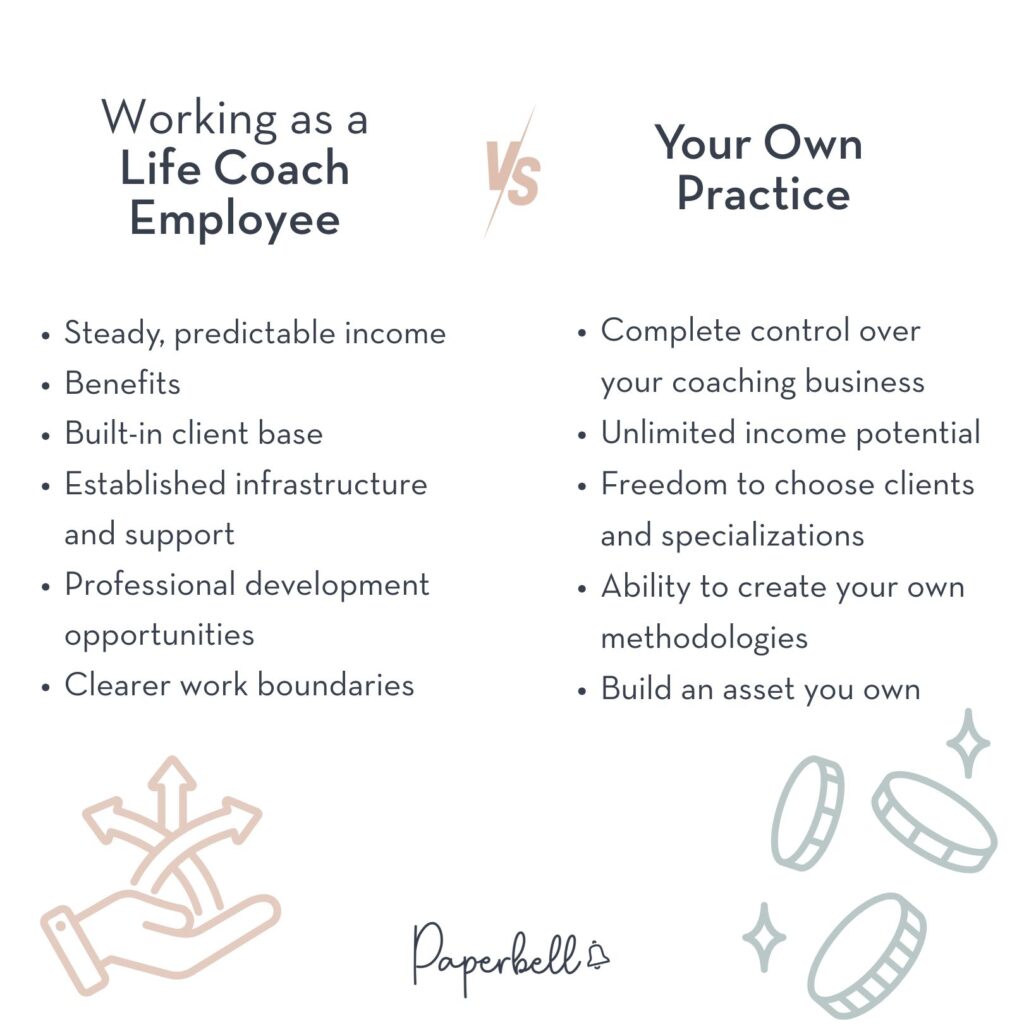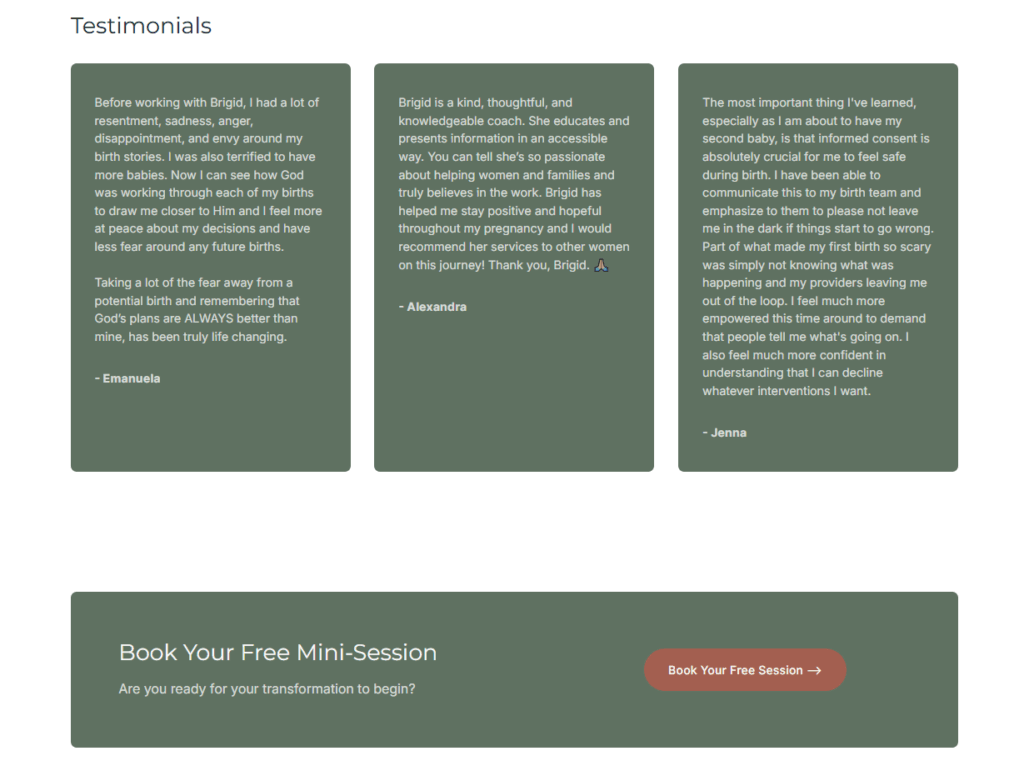So you’ve got your life coaching certification (or are working toward it), and now you’re wondering:
“What exactly can I do with these awesome coaching skills?”
The good news is that there are so many life coaching employment opportunities today. Whether you prefer corporate wellness positions or decide to start your own coaching business, the paths available to you as a life coach extend far beyond what most people realize.
This guide explores the current life coaching job landscape, compares employment and entrepreneurship, and highlights the most promising coaching niches for growth and income.
With the right information, it’s easy to choose a direction that aligns with personal strengths, goals, and lifestyle.
Finding Life Coach Jobs
The life coaching industry continues to expand, with the International Coaching Federation (ICF) reporting consistent growth over time. For instance, from 2019 to 2022 alone, the industry grew by a whopping 54%!
For more insights on the coaching industry, be sure to brush up on our 2025 Coaching Trends article.
As more large organizations start to recognize the value of coaching for employee development and retention, careers for life coaches have diversified well beyond private practice.
Today, you’ll find life coaches in corporate settings, educational institutions, healthcare organizations, and even government agencies! Plus, with remote work becoming normalized, geographic limitations are less restrictive than they were before.
Where to Find Life Coaching Positions
If you’re looking for a job as a life coach rather than starting your own business right away, here are the best places to search for life coaching vacancies, including some popular coaching marketplaces:
Specialized Job Boards:
- ICF Job Board (specifically for credentialed coaches)
- SHRM (Society for Human Resource Management) job listings
- Wellcoaches job board for health and wellness coaching positions
Companies That Regularly Hire Life Coaches:
- Major tech companies like Google, Microsoft, and LinkedIn (for internal coaching roles)
- Healthcare systems for wellness and patient support coaching
- Universities and educational institutions for student success coaching
Networking Opportunities:
- ICF chapter meetings and events
- Coaching conferences
- LinkedIn industry groups
- Local business networking events
The key to finding (and landing!) these positions often lies in how you position your specific expertise and the coaching methods you’ve mastered.
Working as a Life Coach Employee vs. Your Own Coaching Practice

One of the biggest decisions you’ll face is whether to work as an employee or build your own coaching business. Both paths have distinct advantages and challenges.
Employee Life Coach Pros:
- Steady, predictable income
- Benefits (healthcare, retirement, paid time off)
- Built-in client base
- Established infrastructure and support
- Professional development opportunities
- Clearer work boundaries
Employee Life Coach Cons:
- Less control over coaching methods and approach
- Limited flexibility with scheduling
- Potentially lower earning ceiling
- Less freedom to choose clients and specializations
- Organization may prioritize metrics over client progress
Independent Practice Pros:
- Complete control over your coaching business, including setting your own coaching or consulting rates
- Unlimited income potential
- Flexibility to set your own hours and coaching prices
- Freedom to choose clients and specializations
- Ability to create your own methodologies
- Build an asset you own
Independent Practice Cons:
- Inconsistent income, especially at first
- Responsible for finding your own clients
- No built-in benefits
- Need to handle all business operations
- Can be isolating compared to organizational work
At the end of the day, it all depends on your preferences. For example, I discovered that despite the drawbacks of having my own business and managing clients, I find it less stressful not having to rely on a single employer for income!
Financial Considerations for Both Paths
As an employee coach, you can expect to make an average of $67,800 per year, depending on location, credentials, and the organization. Executive coaching positions can pay significantly more – the average salary in the US is $98,264 per year!
As an independent coach, your income potential is theoretically unlimited… but most coaches do hit a bottleneck. New coaches might charge $75-150 per session, while experienced coaches who are more niche can command $300-500+ per hour.
I’ve personally paid up to $1,000 per hour for a coach’s time! When someone offers a good enough opportunity for personal development, it can be worth it.
What many new coaches don’t realize is that your hourly rate as an independent coach needs to be significantly higher than an employee’s equivalent hourly wage to account for:
- Self-employment taxes
- Healthcare costs
- Marketing expenses
- Non-billable administrative time
- No paid vacation or sick days
With that being said, you can significantly cut down on your non-billable administrative tasks when you have Paperbell! Forget chasing down clients for invoices or booking sessions… and forget the hassle of creating and launching your own website.
Paperbell makes it all buttery-smooth, and you can try it all for free.
From Employee to Entrepreneur: Transition Strategies
Lots of certified life coaches begin with a traditional job, then gradually transition to independence as they build confidence, skills, and a client base. Others even go on to create their own coaching programs or consultant certifications.
Here’s what I recommend for coaches who want to try such a transition and work up to starting their own coaching business:
- Start part-time: Keep your day job while building your practice on evenings and weekends.
- Negotiate a reduced schedule: Ask for a 4-day workweek to free up time for your practice (that’s what I did!).
- Build your foundation: Get your website, scheduling system, and client processes in place before going full-time (Paperbell does it all).
- Create a financial runway: Save 3-6 months of expenses before making the leap.
I also suggest prioritizing getting testimonials and reviews to build up a foundation of trust with your future audience and clients.
Full-Time and Part-Time Coaching Opportunities
Here’s a quick overview of the most common employment arrangements for certified life coaches:
Corporate Coaching Positions
- Job description: Provide one-on-one coaching to employees and executives, facilitate workshops, support leadership development
- Potential salary: $65,000-$120,000+ depending on level and company size
- Who hires: Tech companies (Google, Microsoft), consulting firms (Deloitte, McKinsey), financial institutions (JP Morgan, Bank of America)
Educational Institution Opportunities
- Job description: Coach students on career development, life skills, academic success
- Potential salary: $45,000-$75,000
- Who hires: Universities, community colleges, private schools, online education platforms
Healthcare and Wellness Organization Roles
- Job description: Support patients with health goals, behavior change, stress management
- Potential salary: $50,000-$85,000
- Who hires: Hospital systems, insurance companies, wellness platforms (Noom, WW)
Remote and Virtual Coaching Positions
- Job description: Provide coaching services through digital platforms
- Potential salary: $35,000-$90,000 base plus potential bonuses
- Who hires: BetterUp, CoachHub, Bravely, Lyra Health, Ginger
Contract and Consulting Arrangements
- Job description: Project-based coaching for specific initiatives or populations
- Potential salary: Varies widely, often $75-200+ per hour
- Who hires: Consulting firms, HR departments, executive education programs
Coaching Specializations and Niche Areas
Your coaching niche can make a huge difference in the job opportunities you’ll get and your earning potential. Here are some of the most promising areas to consider.
High-Demand Coaching Specializations:
- Executive and Leadership Coaching: Help leaders improve performance and develop their teams.
- Executive Coaching Certifications
- Career Transition Coaching: Support professionals who are changing careers or want to advance.
- Health and Wellness Coaching: Guide clients toward better physical and mental well-being.
- Relationship Coaching: Help clients improve personal and professional relationships.
- Financial Coaching: Support clients to achieve their financial goals and develop healthy money habits.
Emerging Niches with Growth Potential:
- Digital Wellness Coaching: Help clients develop healthy relationships with technology.
- Neurodiversity Coaching: Support people with ADHD, autism, and other neurodivergent conditions.
- Climate Anxiety Coaching: Help clients navigate eco-anxiety and environmental concerns.
- Grief and Loss Coaching: Support clients through significant life transitions and losses.
- Anti-Racism and DEI Coaching: Help individuals and organizations develop more inclusive practices.
The more specific your niche, the more you can position yourself as an expert in that area… and the higher rates you can command!
Building Your Coaching Resume and Credentials
Whether you want a steady job or decide to build a coaching business, strong credentials with an accredited training program will set you apart. Here’s where to find those credentials.
Essential Certifications and Training
The gold standard remains ICF credentials, which come in three levels:
- Associate Certified Coach (ACC): Entry-level credential requiring 60+ training hours and 100+ coaching hours
- Professional Certified Coach (PCC): Mid-level credential requiring 125+ training hours and 500+ coaching hours
- Master Certified Coach (MCC): Advanced credential requiring 200+ training hours and 2,500+ coaching hours
Beyond ICF certification, consider specialized training in your niche area. Many employers look for both general coaching credentials and specific expertise relevant to their industry.
Portfolio Development for Job Applications
When applying for coaching positions, your resume should highlight:
- Specific coaching results and accomplishments
- Relevant industry experience
- Training and certifications
- Coaching models or frameworks you’re proficient in
- Client success stories and testimonials
If you’re going independent, your website becomes your resume. If you’re shaking your head in frustration at the idea of figuring out website creation, though… don’t worry!
With Paperbell, you can quickly create a professional (and beautiful) coaching site that showcases your coaching packages, processes, and expertise without any tech headaches.
Leveraging Testimonials and Success Stories
Nothing sells your coaching skills like proof of results. Collect testimonials that speak to specific outcomes clients have achieved through your coaching.
Here’s an example of what testimonials can look like (from Loreto Wellness) when building your website on Paperbell:

FAQs About Life Coaching Job Opportunities
How do you get hired as a life coach?
The most direct path is to get a recognized certification (like ICF credentials), gain experience through pro bono or reduced-rate coaching, build a portfolio of results, and apply to organizations that hire coaches.
What kind of life coaches make the most money?
Executive coaches typically make the most money, with some charging $500+ per hour. For executive coaches with their own businesses, there’s virtually no limit to how much you can charge for an hour of your time.
How much is the salary of a life coach when working with a corporate company?
In-house corporate coaches typically earn between $65,000 and $120,000 per year. Contract coaches who work with corporate clients can charge anywhere from $200 to $500+ per hour, depending on their experience and niche.
Which companies hire life coaches?
Major tech companies (Google, Microsoft, LinkedIn), consulting firms (Deloitte, KPMG), financial institutions, healthcare organizations, educational institutions, and coaching platforms like BetterUp and CoachHub regularly hire life coaches.
Finding Your Perfect Life Coaching Path
Whether you choose a traditional job, starting a coaching business, or a hybrid approach, you’ll find that the life coaching industry offers wonderful opportunities when you’re committed to putting in the work.
If you’re ready to dip your toes into starting your own coaching practice, make it easier on yourself by trying out Paperbell for free! With Paperbell, you get a coaching business in a box—beautiful website, scheduling, payment processing, contracts, client management, and so much more.
Create your account today and discover how simple running your coaching business can be!










